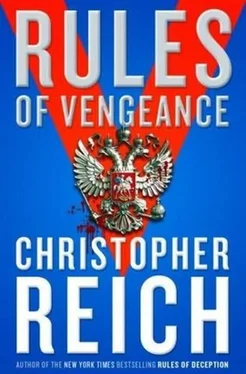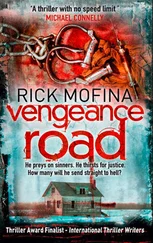Kate rose, her ribs beginning to hurt in earnest. Gingerly she opened her jacket and saw a streak of blood on her blouse. The fabric was torn, and through it she could see a gash. Looking closer, she spotted a hole in her jacket where a bolt or a nail had passed, grazing her. A few centimeters to the right and she’d most probably be dead.
She leaned against the car door, transfixed by the hellish tableau. The bomb had been detonated as the third and last Mercedes had driven by. It appeared that the blast had lifted the automobile into the air and driven it against the wall of the building. The car sat on all four tires, crumpled, ablaze, already a husk. Barely ten meters in front of it, the second Mercedes lay on its side. Two bodies lay half in, half out of the front windscreen. It was also on fire, and the flames darted like snakes’ tongues through hundreds of perforations in the car’s skin.
Nails, thought Kate, glancing at Cleak, feeling the ache of her own wound. They had packed the car like a suicide bomber’s vest.
The lead Mercedes had crashed into a lamppost. She noted that the airbags had deployed and that there was some motion inside. The rear door opened. A man crawled out and fell to the ground, his face bloody.
Closer to her, the chassis of the two SUVs that had provided escort were also riddled with punctures, their tires exploded, windows blown out. All of their doors stood ajar, and big, barrel-chested men in dark suits were tumbling out, several brandishing compact machine guns, and rushing toward the lead Mercedes. Already two bodyguards were pulling a second man out of the rear seat.
Graves ran across the intersection, past the Suburbans, and advanced on the lead sedan. He pushed his way past the bodyguards, calling out his name and identifying himself as a policeman. Kate followed close behind.
“Who was in the motorcade?” Graves asked.
“They wanted me,” said the bloodied man. He lay on the pavement, propped up on an elbow.
Graves knelt down next to him. “What is your name, sir?”
“Ivanov. Interior Minister Ivanov.”
Kate knew the name, if not the face. Ivanov was one of a half-dozen men rumored to be candidates for the Russian presidency. “Stay there,” she counseled him. “An ambulance will be here shortly.”
Ivanov lay down.
The whine of approaching sirens filled the air. In the space of thirty seconds, Kate counted five cars approaching from all directions. Silence no more. Graves broke off from the Russian interior minister and walked toward the second Mercedes. Flames shot from the interior. Inside the inferno, the driver remained strapped in his seat. He had been beheaded by the blast. The two men who had been ejected through the windscreen appeared to be dead, too, as did a body slumped in the rear seat. It was difficult to be certain because of the fire.
There was no question about the sedan having been the target of the blast. The interior seemed to have been obliterated. The chassis was grotesquely bent. There was little left inside it except the remnants of the seats.
“Who was in the other cars?” Graves asked one of the Russian bodyguards.
“Mr. Witte and Mr. Kerensky, Interior Minister Ivanov’s assistants. And Mr. Orlov, our ambassador to Great Britain.”
“What about Mischa?” Kate asked, referencing Russell’s video message.
“No Mischa.”
“Yes,” said Kate. “He was part of the visiting party.”
“No,” replied the bodyguard, more vehemently. “No one named Mischa is traveling with us.”
The first police cars arrived. Officers ran to assist the injured, but Graves signaled for them to come to him. “Get tape around the perimeter. These buildings are being evacuated, and I don’t want every Tom, Dick, and Harry to muddle the evidence. Once you’re done, you can tend to the injured.”
Kate stepped away from Graves and began heading up Storey’s Gate, past the site of the explosion. Just before the blast she’d heard a man yelling some kind of warning. Strange, but she’d forgotten about it until Graves had mentioned the need to preserve evidence. She recalled seeing a cap of graying hair, a navy jacket.
By now men and women were streaming out of the buildings on both sides of the road. In case of terrorist attack, city law called for the mandatory evacuation of all buildings and residences in the area. Many hurried up the street, anxious to escape. Others lingered, exhibiting a morbid curiosity about the blown-up vehicles and the fate of those inside.
Kate walked against the tide. Victims of the blast lay on the sidewalk. Most seemed to have superficial wounds: bloody noses caused by the concussion of the blast, ruptured eardrums, cuts inflicted by flying glass, shock. She paused to let them know that help was on its way, then continued her search.
Graying hair. Navy jacket. She saw no one who fit the bill.
There was a crater where the bomb had gone off. The car itself sat twisted and in flames 3 meters away. As she passed it, she raised a hand to ward off the ferocious heat. Black smoke rose into the sky, mixing with dust and debris, burning her eyes and making it difficult to see. She held a hankie to her mouth, but even then the air was hot and choked with soot. She began to cough.
Another Mercedes lay burning 10 meters up the street. Suddenly a man fell out of the vehicle and began to crawl away from it. A halo of flames surrounded his head. Clothing hung in tatters from his arms and chest, but his back appeared to be flayed to the bone. She heard a voice yell, “Lie down” and saw another man running to his assistance, throwing a jacket over his head and extinguishing the flames. The Samaritan had graying hair, and the jacket he’d used to put out the flames was a navy blazer.
Kate radioed Graves. “I’m halfway down Storey’s Gate. Get over here. I’ve found the man I was looking for.”
Within seconds Graves was by her side, two policemen in tow. “Where is he?”
“That’s him. Kneeling next to the injured man.”
Graves shouted instructions, and one of the policemen ran forward and threw the man to the ground.
“Don’t touch him!” shouted the Samaritan, his words clear, the American accent pronounced. His face was covered in blood, but he sounded strong and in control of his wits. “He has third-degree burns all over his body. Get a poncho and cover him up. There’s too much debris in the air. You have to protect the burn or he’ll die of infection.”
Kate knelt beside him. “What’s your name?” she asked.
“Ransom. Jonathan Ransom. I’m a doctor.”
“Why did you do this?” she demanded.
“Do what?”
“This. The bomb,” said the woman. “I saw you shouting at someone back there. Who was it?”
“I don’t-” The man bit back his words.
“You don’t what?”
For a long moment, the man didn’t answer. He stared past her, and for a minute she thought he had fallen into a state of shock. Finally he looked at her. “I don’t know,” he said.
Then he laid his head down on the pavement and closed his eyes.
From Division’s office in Lambeth , south of the Thames, Frank Connor heard the blast and immediately turned on the television. A bulletin cut into programming within five minutes. A still photograph of the Department of Business, Enterprise, and Regulatory Reform was displayed as a reporter offered the first sketchy details of a car bombing near Victoria Street, in the heart of London. A rattled eyewitness followed, describing the blast.
Connor watched intently, popping open a can of Coca-Cola and sneaking glances out the window. It wasn’t long before he caught the plume of smoke drifting above the skyline. He knew about explosions, and this one was a monster.
Читать дальше












